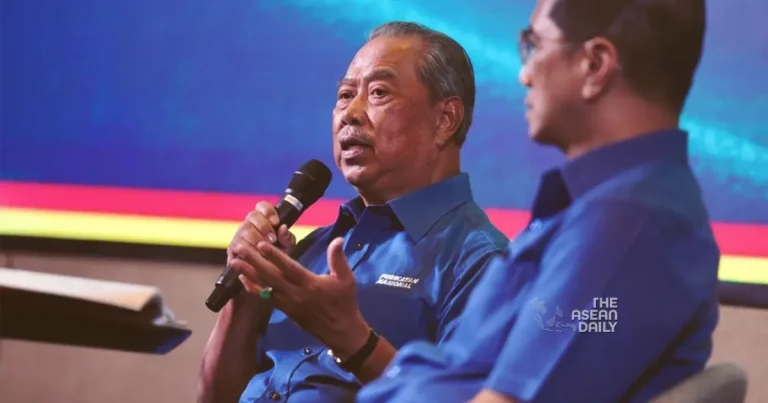29-11-2023 (KUALA LUMPUR) In a surprising twist, Malaysia’s de facto opposition leader, Muhyiddin Yassin, reversed his decision to step down as the president of Parti Pribumi Bersatu Malaysia (Bersatu) just 24 hours after making the announcement. Despite appearing secure in his position, Muhyiddin’s unexpected move has sparked speculation about the underlying motives behind his decision.
Muhyiddin, a party founder and influential figure, stated that he initially intended to leave but was convinced by his wife to seek another term. The high drama surrounding his announcement raises questions about the true extent of his support within Bersatu.
Shortly after Muhyiddin’s announcement, Bersatu’s Supreme Council convened an emergency meeting and unanimously rejected his decision. This mirrors a similar tactic employed by Muhyiddin earlier this year when he offered to resign after facing corruption and money laundering charges. On that occasion, the Supreme Council rejected his resignation, labeling the charges as political prosecution.
Cynics argue that by securing a resounding vote of confidence through the Supreme Council’s rejection, Muhyiddin has effectively eliminated any potential challengers to his power in the upcoming internal polls in 2024.
Another possible explanation for Muhyiddin’s U-turn is the desire to prevent a split within the party. Tensions have been brewing between Bersatu’s deputy president, Faizal Azumu, and the party’s secretary general, Hamzah Zainuddin, both vying for the top leadership position. By ensuring that the presidency remains unavailable for another term, Muhyiddin may have aimed to ease the political temperature within the party.
Moreover, Muhyiddin’s role as the public face of Perikatan Nasional (PN) coalition in the next general election is crucial. While Bersatu is not the largest party in PN, the influential Parti Islam Se-Malaysia (PAS) holds 43 parliamentary seats compared to Bersatu’s 31. PAS president Abdul Hadi Awang is widely seen as an unsuitable candidate due to health concerns and his polarizing statements against minority communities. Thus, PN relies on Muhyiddin’s appeal to voters to regain power in Putrajaya.
A compelling explanation for Muhyiddin’s stunt may lie within Bersatu itself. Despite PN’s success in the recent state elections, Bersatu has experienced a decline in political strength. Several Bersatu Members of Parliament publicly declared support for Prime Minister Anwar Ibrahim’s government while maintaining loyalty to Bersatu. These declarations, made possible by a legal loophole that allows MPs to switch allegiances without losing their seats, have exposed Bersatu’s vulnerability.
Former law minister Wan Junaidi Tuanku Jaafar revealed that all parties were aware of the loophole when the anti-hopping law was passed. However, Bersatu failed to address this issue during the law’s drafting. Speculation suggests that more Bersatu MPs may defect, further pressuring Muhyiddin to take political responsibility for the loss of support.
Nevertheless, with the swift rejection of his resignation by the Bersatu Supreme Council, Muhyiddin has solidified his political position. This strategic move places him in a favorable position to retain the presidency in the upcoming Bersatu internal elections. If successful without facing any challengers, Muhyiddin will be well-positioned to target the next general election, expected by 2027, with the goal of becoming a second-time prime minister, surpassing Mahathir’s record.
While the future of Malaysian politics remains uncertain, Muhyiddin’s calculated political maneuver ensures his continued prominence as a major player in the country’s political landscape.




